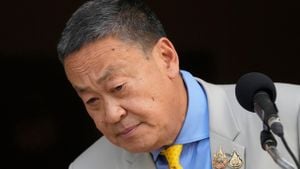Brazil is facing another scandal involving political corruption after the shocking details of a staged assassination attempt on Taboão da Serra Mayor José Aprígio emerged. The incident unfolded just one week before the municipal elections, raising grave concerns about the lengths to which some political figures may go to manipulate voter perception and gain media attention.
On the day of the attack, Aprígio was ambushed, leaving him with gunshot wounds as criminals fired six shots at his vehicle. "Graças a Deus que eu tenho o apoio da minha família, de vocês, das igrejas que estão orando por mim, da minha família, mas dói muito," Aprígio remarked, reflecting on the violent encounter from his hospital bed, grateful for the support around him.
Initially shocking and politically destabilizing, the violent act seemed to favor Aprígio, who was optimistic about his chances after the first round of elections, where he placed second. Despite the ordeal, he lost the election shortly after. Three days following the assault, police apprehended Gilmar de Jesus Santos, who eventually confessed to orchestrate what was deemed a false attack. “Por que isso não foi feito quando o prefeito estava em extrema vulnerabilidade?” questioned Gilmar, indicating the plan’s lack of credibility.
According to Gilmar, he was under instructions to fire shots at the vehicle with the mayor inside, but the intent was to avoid serious injury. “Insistiram para fazer do jeito que eles queriam, para parecer um fato real,” he told investigators, outlining how they planned the attack to appear as if it were genuinely aimed at the mayor, creating the necessary drama just before voters cast their ballots.
The political fallout from this staged attempt revealed how deeply corruption runs within Brazilian politics. Juliano Atoji, the prosecutor involved, noted, “Sim, ao que tudo indica foi um erro de cálculo grotesco naquele momento em que eles acreditaram que uma blindagem 3A seria capaz de segurar o tiro de fuzil.” This highlights the unrealistic expectations and reckless planning behind the scheme.
Beyond Gilmar’s confession, the investigation uncovered the involvement of other key individuals, like Anderson da Silva Moura and Clovis Reis de Oliveira, who were suspected of orchestrations behind the scenes. While many accomplices were apprehended, several remained at large, including those thought to be linked to the mayor’s inner circle.
The circulating rumors assert Aprígio might have knowledge of the plan, prompting investigators to probe even closer to the political elite. With the intricacies of local governance being woven closely with personal ambitions, the case brings to light the troubling intersection of crime and politics, as emphasized by authorities during the investigation.
The law enforcement officials have affirmed their commitment to following the trail of corruption and deception through various channels. The revelations surrounding this incident serve as yet another wake-up call of the systemic issues plaguing the political fabric of Brazilian democracy.
While the full extent of the conspiracy remains unclear, it has become evident the incident is not isolated. Multiple parties are now under scrutiny, with about 15 individuals investigated, including former governmental officials and close aides to the mayor. The community’s reaction to these allegations is one of outrage and disappointment, as they attest to the fragile trust between voters and elected officials.
Calls for accountability and integrity within the political sphere are growing louder. Society is increasingly aware of the need for transparency and investigation, especially as tales of deceit emerge from the shadows of such high-stakes events. The repercussions of this incident extend beyond Taboão da Serra, symbolizing broader challenges faced by Brazilian politics.
After the fallout from the investigation, it remains to be seen what measures may be put forth to combat such corrupt practices. With public trust on the line, many hope this will spur reforms and tighter controls to uphold democratic principles and protect citizens from those who would so readily jeopardize public safety for political gain.
Up next, authorities are expected to deliver their findings. The public waits with bated breath. With hopes for justice and truth, they remain vigilant about the actions of their leaders moving forward.



